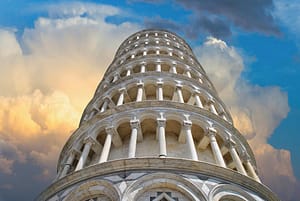Pisa became an important naval base and commercial port under Rome and remained a significant port for centuries. The city’s golden days began late in the 10th century, when it became an independent maritime republic and a formidable rival of Genoa and Venice. A century on, the Pisan fleet was sailing far beyond the Mediterranean, successfully trading with the Orient and bringing home new ideas in art, architecture and science. At the peak of its power (the 12th and 13th centuries), Pisa controlled Corsica, Sardinia and the Tuscan coast. Most of the city’s finest buildings date from this period, when the distinctive Pisan-Romanesque architectural style with its use of coloured marbles and subtle references to Andalucian architectural styles flourished. Many of these buildings sported decoration by the great father-and-son sculptural team of Nicola and Giovanni Pisano.
Pisa’s support for the imperial Ghibellines during the tussles between the Holy Roman Emperor and the pope brought the city into conflict with its mostly Guelph Tuscan neighbours, including Siena, Lucca and Florence. The real blow came when Genoa’s fleet inflicted a devastating defeat on Pisa at the Battle of Meloria in 1284. After the city fell to Florence in 1406, the Medici court encouraged great artistic, literary and scientific endeavours and re-established Pisa’s university, where the city’s most famous son, Galileo Galilei, taught in the late 16th century. During WWII about 40% of old Pisa was destroyed.
Visits to the art museums of Pisa give people the insight on the artistic attractions and culture of the people of Tuscany and Italy on a whole. The beautiful and bold artwork is inspiration to many budding painters and artists. Pisa offers any museums like Museo dell’Opera del Duoma and the Museum of Graphic Arts to Palazzo Reale. The cuisine is very diverse and has varieties of dishes. Olives are mainly used in preparation of dishes. Desserts are prepared in a traditional way using dried fruits. Wine is also very popular here. The people of Pisa celebrate myriad of festivals too. From the fragrant Flower Festival to the Crazy Street Festival, every festival paints the city in its own colours and charm. The Christmas Market festival is also very popular in Pisa and people from around the world come to witness it. On the first Sunday of every month an antique market is held, which houses many items to entice the tourists and locals. The music and dance of Pisa are also of various styles. The people of Pisa rejoice in Opera, Ballet and Classical Music. They also perform expressive dance forms in Pisa.

